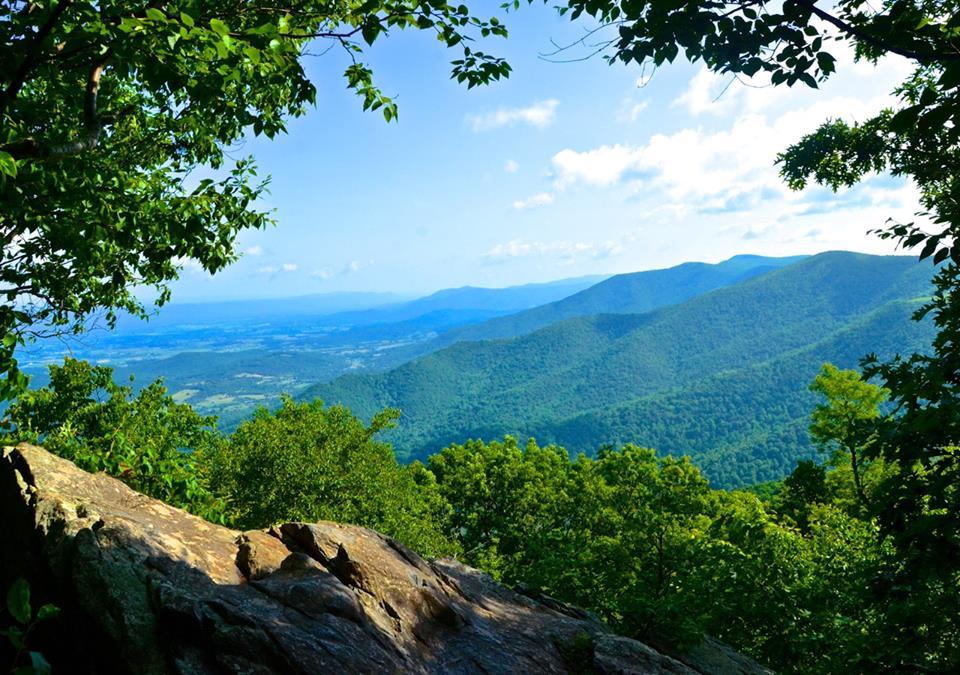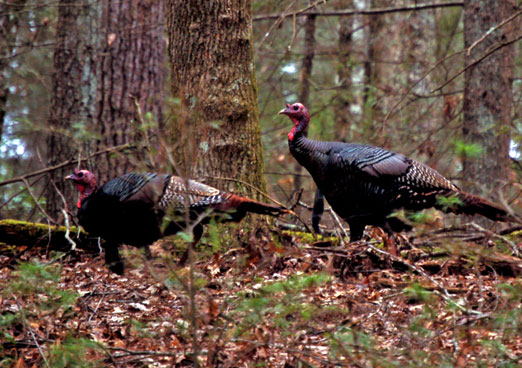
A view of the mountains from the Appalachian Trail by the Big Meadows Campground in Shenandoah National Park: Glynn Wilson
Staff Report –
WASHINGTON, D.C. – In a clean break from the anti-nature politics and policies of the previous administration, the Biden-Harris administration has begun to outline a different vision for how the United States can work collaboratively to conserve and restore public lands, waters and wildlife that in many ways support and sustain the nation.
The recommendations are contained in a report released this week, outlining a locally led and voluntary nationwide conservation goal to conserve 30 percent of U.S. lands and waters by 2030. It calls for a 10-year effort to support locally led and voluntary conservation and restoration efforts across public, private, and Tribal lands and waters in order to create jobs and strengthen the economy’s foundation, to address inequitable access to the outdoors in places and to tackle problems in nature caused by climate change.
The report, submitted to the National Climate Task Force, was developed by the U.S. Departments of the Interior, Agriculture and Commerce and the White House Council on Environmental Quality. It outlines eight principles that should guide the nationwide effort, including a pursuit of collaborative approaches and a commitment to supporting the voluntary conservation efforts of farmers, ranchers, and fishers, while also honoring Tribal sovereignty and private property rights.
“At their best … America’s lands and waters are places where Americans find unity and forge common bonds. Over the past year, in particular, America the Beautiful has been a source of strength, comfort, and inspiration for a nation battling a deadly pandemic,” according to the report’s introduction. “Parks, playgrounds, river fronts, and open spaces offered refuge to families seeking fresh air and a safe place to unwind.
“The past year has deepened the love and appreciation that many people in our country feel for nature, and for the work that past generations have done to conserve natural places and wildlife for us to enjoy.”
It has also, however, brought into focus three problems that threaten the lands, waters, and wildlife upon which we depend.
The Disappearance of Nature
Both globally and nationally, scientists are sounding the alarm about a catastrophic extinction crisis that threatens the biodiversity of the planet and the health of the natural systems that supply our food, water and other resources. In the U.S., approximately 12,000 wildlife species need conservation assistance to avoid the threat of extinction. The disappearance of bees and other pollinators is reducing crop yields and threatens food security.
Already, there are three billion fewer birds in North America than there were 50 years ago. Critical ocean habitats are declining, including an estimated 90 percent loss of live corals in the Florida Keys over the past 40 years and up to a 90 percent loss of bull kelp off of the northern coast of California in less than 10 years. Roughly half of the riparian ecosystems and wetlands in the lower 48 States have already been lost, while more than 17,000 square miles of ranchland and farmland were lost to development or fragmented in the last two decades alone.
Climate Change
The nature crisis is exacerbated by climate change, which is rapidly altering ecosystems on land and water. Ocean waters are warming, causing sea level rise, species migration, and altering circulation patterns. Ocean acidification and deoxygenation due to climate change pose significant threats to many marine species that sustain ocean life as we know it, such as seagrasses, krill, and corals.
Climate change is contributing to historic droughts and floods, more frequent and intense wildfires and natural disasters, and the spread of invasive species. The impacts of climate change on habitat are forcing some wildlife to new areas to survive, while squeezing other species closer to extinction.
“These trends are predicted to continue, disrupting the balance of nature across the country,” the report indicates.
Inequitable Access to the Outdoors
As a result of discrimination and segregation in housing, transportation, conservation, and natural resource policy, communities of color and low-income communities have disproportionately less access to nature’s benefits, such as clean water, clean air, and access to nature.
These same communities, meanwhile, shoulder a disproportionate share of the costs of nature’s decline, including more pollution nearby, loss of subsistence fishing and hunting, and encroaching industrial development. An estimated 100 million Americans do not have a park within a ten-minute walk of their home In too many neighborhoods and communities across America, families are finding too few close-to-home opportunities to safely enjoy the outdoors.
Based on feedback gathered in the administration’s first 100 days, the report identifies six priority areas for the administration’s early focus, investments and collaboration.
* Creating more parks and safe outdoor opportunities in nature-deprived communities.
* Supporting Tribally led conservation and restoration priorities.
* Expanding collaborative conservation of fish and wildlife habitats and corridors.
* Increasing access for outdoor recreation.
* Incentivizing and rewarding the voluntary conservation efforts of fishers, ranchers, farmers and forest owners.
* Creating jobs by investing in restoration and resilience projects and initiatives, including the Civilian Climate Corps.
“The President’s challenge is a call to action to support locally led conservation and restoration efforts of all kinds and all over America, wherever communities wish to safeguard the lands and waters they know and love,” writes Interior Secretary Deb Haaland in the report, along with, Agriculture Secretary Tom Vilsack, Commerce Secretary Gina Raimondo and White House Council on Environmental Quality Chair Brenda Mallory. “Doing so will not only protect our lands and waters but also boost our economy and support jobs nationwide.”
The Biden-Harris administration is already taking steps to support outdoor recreation and equitable access to the outdoors.
In late April, USDA expanded the Conservation Reserve Program by offering new incentives, higher rental rates, and more focused attention on sensitive lands with a goal of enrolling 4 million acres and capturing 3.6 million metric tons of CO2 equivalent in this voluntary conservation program.
This week, the U.S. Fish and Wildlife Service announced a proposal for the largest expansion in recent history of hunting and sport fishing opportunities for game species across 2.1 million acres at 90 national wildlife refuges and on the lands of one national fish hatchery.
The National Oceanic and Atmospheric Administration (NOAA) recently announced the expansion of the Flower Garden Banks National Marine Sanctuary, nearly tripling the size of the sanctuary and protecting 14 reefs and banks that are habitat for recreationally important fish.
In the coming days, the National Park Service will announce $150 million in funding for the Outdoor Recreation Legacy Partnership Program, which helps build parks in underserved communities.
NOAA is working in partnership with the State of Connecticut to create a living classroom for education, research, and recreation by designating a National Estuarine Research Reserve in Long Island Sound. The final designation paperwork is expected by January 2022, which will make it the 30th estuary reserve in the national system.
To help measure and track progress toward the nation’s first conservation goal, the report calls for the establishment of an interagency working group, led by the U.S. Geological Survey, the Natural Resources Conservation Service and NOAA in partnership with other land and ocean management agencies. The working group will develop the American Conservation and Stewardship Atlas, a tool that will better reflect the voluntary contributions of farmers, ranchers, forest owners and private landowners, as well as the contributions of fishery management councils and other existing conservation designations on lands and waters across federal, state, local, Tribal, and private lands and waters across the nation.
In line with Executive Order 14008, the agencies developed the recommendations after hearing from Tribal leaders, governors and their staff, Members of Congress and their staff, county officials, state elected officials, state fish and wildlife agencies, leaders on equity and justice in conservation policy, environmental advocacy organizations, hunting and fishing organizations, regional fisheries management councils, farming and ranching organizations, trade associations, forestry representatives, outdoor recreation businesses and users, the seafood industry, and others.
The report recommends additional dialogue with key partners – including states and Tribes – to inform early collaborative conservation efforts and the development of the American Conservation and Stewardship Atlas.
“This report is only the starting point on the path to fulfilling the conservation vision that President Biden has outlined,” the report concludes. “Where this path leads over the next decade will be determined not by our agencies, but by the ideas and leadership of local communities. It is our job to listen, learn, and provide support along the way to help strengthen economies and pass on healthy lands, waters, and wildlife to the generations to come.”

A couple of wild turkeys in Cades Cove in the Great Smoky Mountains National Park in Tennessee: Glynn Wilson













